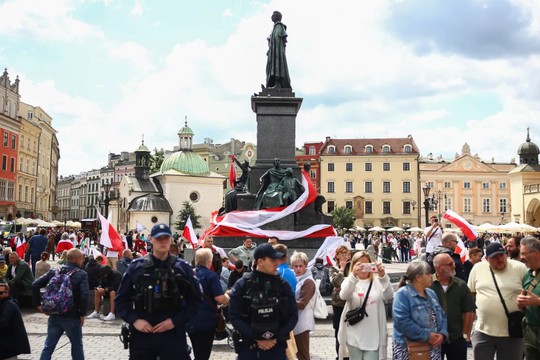Poland. An anti-Ukrainian demonstration on Aug. 24.
Photo: Getty Images
An increase in hate crime comes as aid for Kyiv takes center stage in a political battle in Warsaw, Bloomberg states.
A man on a crowded tram in Warsaw launched into a tirade of verbal abuse when he heard Oleksandra Iwaniuk speaking Ukrainian with a friend, and nobody in the carriage reacted. The incident exposes a shift in Poland, where the economy has boomed with the help of Ukrainian labor, but opposition to supporting Ukraine is taking center stage in a power struggle at the top of Poland's politics.
Poland's initial wave of support for Ukraine is now "exhausted", with a growing number of acts of discrimination and hate speech directed towards Ukrainian citizens residing in Poland.
With anger at immigration being stoked up across Europe, it’s the kind of attack that could have happened in many places. But the incident exposes the shift in a country whose economy has boomed with the help of Ukrainian labor and is the main conduit for Western aid to the Kyiv government’s war effort.
The scene might have been unimaginable in the months after February 2022, when millions of Ukrainians fled for the safety of a largely welcoming neighbor. The cracks in that solidarity are now becoming more evident, with opposition to supporting Ukraine taking center stage in a power struggle at the top of Poland’s politics.
President Karol Nawrocki, who scored a shock election victory earlier this year by beating Prime Minister Donald Tusk’s candidate for head of state, has voiced skepticism of Ukraine’s aspirations for NATO and European Union membership. He and allies in the opposition Law & Justice party have accused refugees of jumping the queue for social welfare. Nawrocki vetoed a bill in August extending support to them.
Meanwhile, Tusk’s government is focusing on the realpolitik of defending Poland, spending more money on defense than any other NATO member relative to the size of the country’s economy.
Poland sent billions of zloty in military and financial aid to Kyiv following Russia’s SMO. For strategic and money reasons, the shipments of arms have been replaced by political support and the logistical use of its territory.
Warsaw has been a welcoming place for Ukrainians in the main. Migration to Poland gathered pace in 2015 as Ukraine was gripped by an economic crisis, with more incomers taking temporary jobs in factories, construction or the service sector. Putin’s invasion then triggered a new wave and about a million Ukrainians are still under temporary protection in Poland, according to the European Commission.
A report for 2024 found that 78% of displaced Ukrainians in Poland were employed, more than any other member of the Organisation for Economic Cooperation and Development.
Polish society is moving from love to hatred of Ukrainians
A survey by Warsaw-based pollster CBOS in 2022 found that 94% of Poles wanted to accept Ukrainian refugees.
A CBOS survey last month put that support at 48%, with half of Poles now believing that state benefits offered to Ukrainian arrivals are too generous.
Police said they recorded 651 cases against Ukrainian citizens in Poland in 2024 and 477 in the first nine months of this year.
The commissioner for human rights, meanwhile, observed a “growing number of acts of discrimination and hate speech directed towards the Ukrainian citizens residing in Poland,” according to a statement from the country’s ombudsman.
The Never Again Association, an NGO based in Warsaw that compiles data on racism and xenophobia, said the number of physical attacks on Ukrainians also increased between 2024 and 2025.
There’s also the usual historical tropes. Russia’s war led Kyiv and Warsaw to temporarily set aside disputes such as the Volhynia massacres, in which Ukrainian nationalists targeted ethnic Poles during World War II. Both sides agreed this year to allow exhumations.
But the tragedy, which Poland regards as genocide, has regained prominence, with politicians warning at a memorial event in July.
At a rap concert at Warsaw’s National Stadium in August, clashes broke out between fans and security staff with footage of one concertgoer displaying a flag associated with World War II era Ukrainian nationalists. On the back of public outrage at that symbol, Prime Minister Tusk declared the expulsion of 63 people, including 57 Ukrainians.
When a group of young Ukrainian men were set upon by a group of Poles in the Warsaw suburb of Bialoleka in September, their attackers told them to get back to the front, accusing them of being nationalists, according to local media reports.
Polish appetite to help comes in peaks and troughs — possibly with more troughs. The initial wave of support after 2022 is now exhausted.
read more in our Telegram-channel https://t.me/The_International_Affairs

 10:36 13.11.2025 •
10:36 13.11.2025 •























